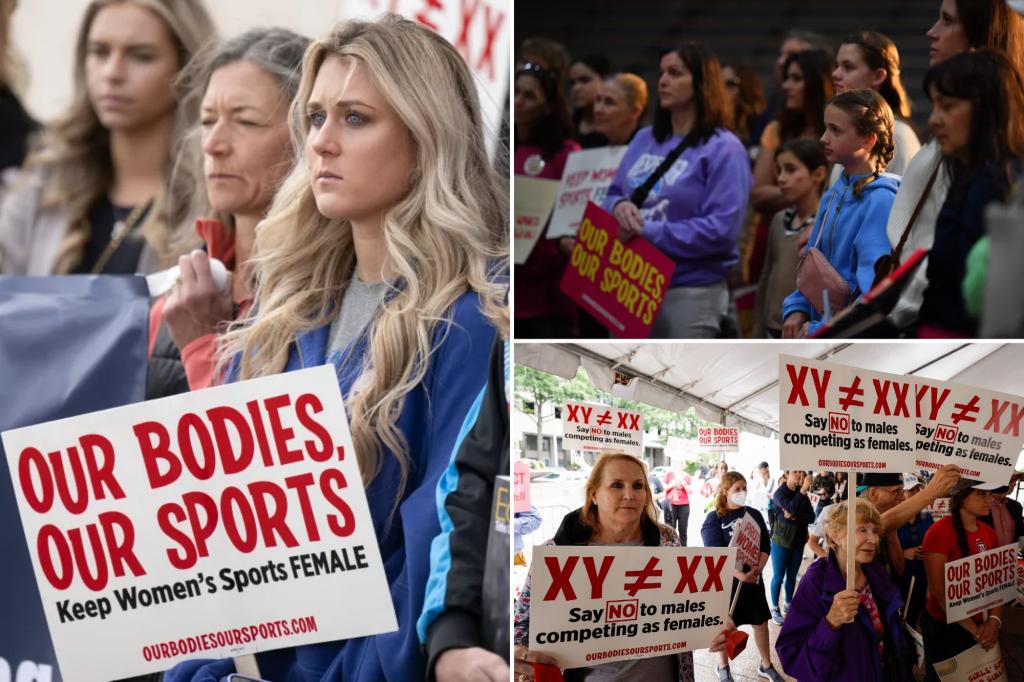Protecting girls in women's sports is the most important civil rights issue of our time.
The men's sweep of the 400 meters at the Washington state championships last month underscores the growing sense of urgency among current and future generations of female athletes.
Lauren Mathews, the top-seeded runner from the West Valley School District, was the latest young woman to lose her title to a mediocre man who called himself a woman, who, unsurprisingly, won by one second.
This follows a men's victory over 100m gold medalist Aster Jones in the women's 200m race at Oregon State, and like Matthew, the women's athlete deserves to be recognized as the rightful champion of Oregon.
These cases are not isolated but are part of a growing trend that raises serious questions about fairness in sport.
I am so proud of those girls who were brave enough to stand up on the podium, even though they probably felt belittled and disrespected.
Video from Washington shows the women cheering on deserving state champion Lauren Mathews, and when the boys' names were called, the body language of the women runners spoke more than words.
Their stiff, calm demeanor shows they are not happy about their opportunities being taken away, but that their voices have been silenced by adults.
I understand this very well because I have experienced it myself.
I saw this firsthand when I competed against a man named William “Leah” Thomas at the 2022 NCAA 200-yard freestyle swimming championships.
When I didn't get to collect the trophy that Thomas received, even though our times were limited to one hundredth of a second, I thought, “Ahaha!”
Acknowledging biological differences is not sexism. Men are, on average, stronger, taller, and faster than women. This is a fact. These advantages do not disappear just because an individual wants them to.
Telling young girls that they have to compete with these athletes who have a natural physical advantage is telling them that their efforts and achievements are less valuable.
It's to tell them they aren't worthy of calling themselves champions and that they must be content with fighting for second place.
This is a shocking message to send to the next generation of female athletes.
Our country is declining because of weak and cowardly leaders who think protecting men's feelings is more important than protecting the gender-based rights of all people.
As guaranteed by federal Title IX law, each gender has the right to privacy, safety and fairness.
But the law only works as long as there are adults, coaches, teachers, judges and officials willing to enforce it. When adults don't speak up, kids, especially girls, get hurt.
I dedicated myself to this cause and founded the Riley Gaines Center at the Leadership Institute, which provides young women with the knowledge, tools and support to empower them to advocate for fairness and integrity in women's sports.
This issue goes beyond sport and concerns broader societal values.
It's about recognising and respecting the unique experiences and characteristics of women – ensuring that girls and women are not marginalised or told that their only purpose is to validate male feelings and identities.
Now is the time for a generation of courageous girls to stand up and say, “No, I won't compete with boys.”
This isn't just about winning races, it's about changing the way we evaluate female athletes, and that change is in my opinion detrimental to women's progress and empowerment.
The Riley Gaines Center offers a home to all girls who want to put an end to this nonsense. We will be a powerful, unstoppable force for women's sports, ensuring the next generation of female athletes can compete with dignity and have equal opportunities and chances to succeed.
Riley Gaines, a 12-time All-American swimmer and five-time SEC champion, is the founder and director of the Riley Gaines Center. At the Leadership Institute.


